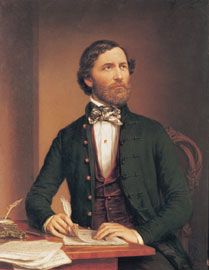Béni Egressy
- View a machine-translated version of the Hungarian article.
- Machine translation, like DeepL or Google Translate, is a useful starting point for translations, but translators must revise errors as necessary and confirm that the translation is accurate, rather than simply copy-pasting machine-translated text into the English Wikipedia.
- Consider adding a topic to this template: there are already 591 articles in the main category, and specifying
|topic=will aid in categorization. - Do not translate text that appears unreliable or low-quality. If possible, verify the text with references provided in the foreign-language article.
- You must provide copyright attribution in the edit summary accompanying your translation by providing an interlanguage link to the source of your translation. A model attribution edit summary is
Content in this edit is translated from the existing Hungarian Wikipedia article at [[:hu:Egressy Béni]]; see its history for attribution. - You may also add the template
{{Translated|hu|Egressy Béni}}to the talk page. - For more guidance, see Wikipedia:Translation.

Béni Egressy (Hungarian pronunciation: [ˈbeːni ˈɛɡrɛʃi]; born Galambos Benjámin; 21 April 1814 – 17 July 1851 in Sajókazinc) was a Hungarian composer, librettist, translator and actor. He created a number of popular melodic compositions, including the one to Mihály Vörösmarty's patriotic poem Szózat.[1] He also authored the librettos of the operas Hunyadi László and Bánk bán by Ferenc Erkel.
Biography
Egressy was born in 1814 in Sajókazinc, today a part of Kazincbarcika, Borsod-Abaúj-Zemplén County, Hungary, to a Protestant pastor.
He entered the stage in 1834, like his older brother Gábor Egressy, and in 1837 became a member of the national theatre in Prague. During the Revolution of 1848, he took part in the fighting and became a member of the Hungarian Honvéd resistance. He was wounded in the Battle of Kápolna and was present during the defense of Komárom under György Klapka, where he wrote the Klapka March. After the rebellion, he received amnesty and returned to the stage.
Works
Egressy was more notable for his acting rather than his compositions. Nevertheless, he composed music for "The Szózat", a famous poem by Hungarian poet Mihály Vörösmarty. The song later became the unofficial "second Hungarian national anthem", besides the Himnusz. His musical works are characterised by a wealth of melodies, having many of the attained great popularity in his homeland.
See also
- Gábor Egressy (actor)
Gallery
-
 Béni Egressy
Béni Egressy -
 Tombstone
Tombstone
References
- ^ Hamilton, Kenneth (2005). The Cambridge companion to Liszt. Cambridge Companions to Music. Cambridge University Press. p. 107. ISBN 9780521622042.
- v
- t
- e









